 Petzlover
Petzlover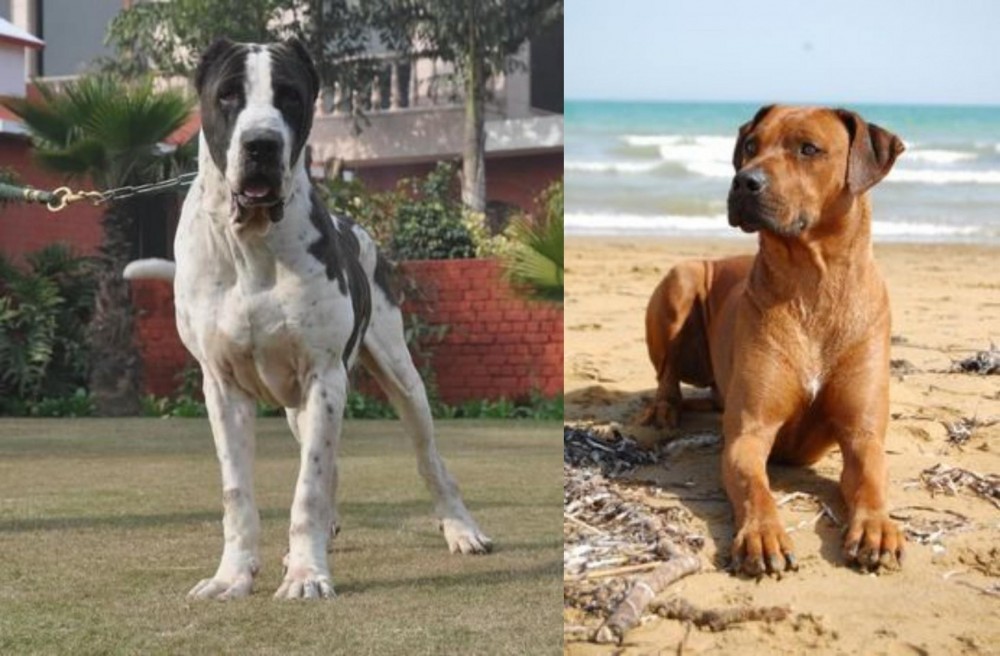 Alangu Mastiff is originated from Pakistan but Rhodesian Ridgeback is originated from Zimbabwe. Alangu Mastiff may grow 17 cm / 7 inches higher than Rhodesian Ridgeback. Alangu Mastiff may weigh 49 kg / 109 pounds more than Rhodesian Ridgeback. Alangu Mastiff may live 4 years less than Rhodesian Ridgeback. Both Alangu Mastiff and Rhodesian Ridgeback has almost same litter size. Both Alangu Mastiff and Rhodesian Ridgeback requires Low Maintenance.
Alangu Mastiff is originated from Pakistan but Rhodesian Ridgeback is originated from Zimbabwe. Alangu Mastiff may grow 17 cm / 7 inches higher than Rhodesian Ridgeback. Alangu Mastiff may weigh 49 kg / 109 pounds more than Rhodesian Ridgeback. Alangu Mastiff may live 4 years less than Rhodesian Ridgeback. Both Alangu Mastiff and Rhodesian Ridgeback has almost same litter size. Both Alangu Mastiff and Rhodesian Ridgeback requires Low Maintenance.
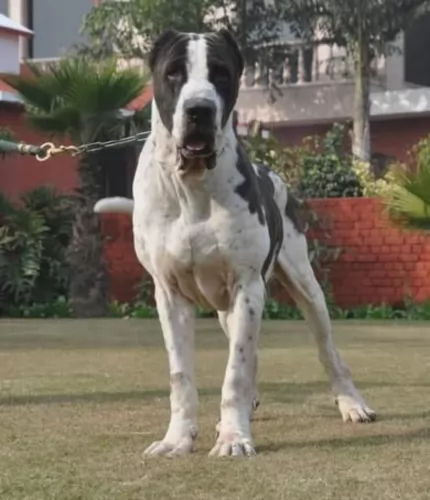 Alangu Mastiff is a breed that ,originates from southern India. Since the very beginning of this breed, it has been used as guard dogs and official dogs of Persian Army. They have been used mostly for wars and as a guard dogs for protection. Also, Alangu Mastiff was used as large gain hunters because of its size and power.
Alangu Mastiff is a breed that ,originates from southern India. Since the very beginning of this breed, it has been used as guard dogs and official dogs of Persian Army. They have been used mostly for wars and as a guard dogs for protection. Also, Alangu Mastiff was used as large gain hunters because of its size and power.
 Known as the African Lion Dog, the courageous Rhodesian Ridgeback hails from Rhodesia, now Zimbabwe.
Known as the African Lion Dog, the courageous Rhodesian Ridgeback hails from Rhodesia, now Zimbabwe.
He was bred essentially to be a hunter as well as a home guardian. These dogs were crossed with European dogs, with the original breed standard being drafted by F.R. Barnes By the 1860s, European colonisers had imported certain European dog breeds to the area such as Greyhound, Terriers, Bloodhounds as well as other breeds. These were mixed with the indigenous African dogs.
The Ridgeback Club was also founded. It was in 1955 that the American Kennel Club recognized the dog as a member of the Hound group.
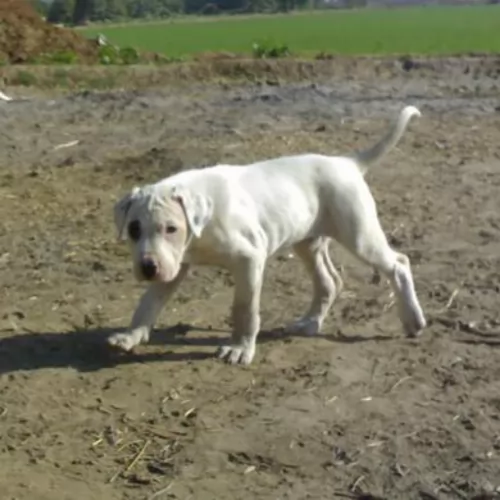 Weight of Alangu Mastiff depends but approximately, male weight is 70-90kg, while females are 60-70kg. While males height is 76-86cm. Females are slightly smaller with an average height of 75-80cm.
Weight of Alangu Mastiff depends but approximately, male weight is 70-90kg, while females are 60-70kg. While males height is 76-86cm. Females are slightly smaller with an average height of 75-80cm.
Lifespan depends drastically on every breed, but it is approximately 8-10 years.
The average litter size of Alangu Mastiff is 6-8 puppies.
Another Name for Alangu Mastiff is Sindh Mastiff.
 Perhaps the most noticeable thing with this large, handsome formidable looking dog is the ridge of hair that runs along his back and gives him his name. The rest of the coat is short and smooth and can be a reddish tan color or wheaten shade.
Perhaps the most noticeable thing with this large, handsome formidable looking dog is the ridge of hair that runs along his back and gives him his name. The rest of the coat is short and smooth and can be a reddish tan color or wheaten shade.
He is a slender, athletic dog with an alert, intelligent face. The ears of the dog are floppy and carried close to the head, being broad and then narrowing to a rounded ear. The tail is long,broad at the base and tapers. He is a large dog that stands at between 61 and 69cm and weighs between 29 and 41kg.
In spite of his athletic build, he isn’t an overly active dog like many other breeds but will require a walk ever day as well as ball- and rope games.
He is a quiet, gentle dog, strong and confident, while also being strong willed and independent. He is tolerant around children, but isn’t the kind of dog that relishes being around little kids who try to climb over him.
He is smart and can be easily trained. Training and socialization turn him into an awesome pet.
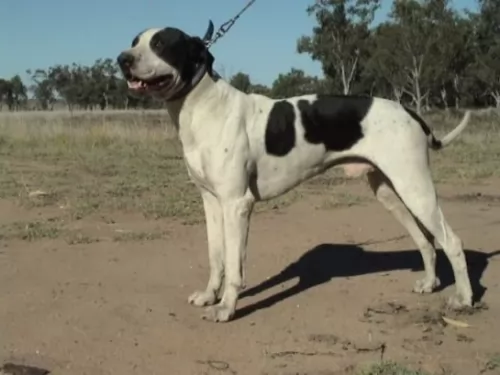 Alangu Mastiff is a very powerful breed. They are a giant breed that is very strong and protective. If you are first time owner, you definitely don’t want this breed as your first pet. They can be very aggressive, and if you are not a dominant owner who knows what he is doing all the time, you can have a lot of troubles with this breed. Alangu Mastiff is a guard dog, and they tend to protect the family no matter what is happening. Of course, with proper care and socialization, they can be wonderful pets that love family, and they can be gentle with children too. Basically, it is very important to socialize them from the earliest age. Alangu is also very hard to train, so you have to be patient and devote a lot of time to train your dog properly. Since they are large dogs, they require a lot of exercises. Walking with the leash is not enough for this breed. They need to run to be fully happy. They can be very aggressive towards other dogs, so it is not very recommendable to spend time with other pets, at least not if they are not socialized. If you train them from an early age, then you should still be careful how your dog behaves around other pets and animals. Don’t get this wrong, Alangu can be a wonderful pet for the whole family, but you have to be careful and well-trained for this breed. They require a lot of attention, patience and time, but overall they can be amazing pets.
Alangu Mastiff is a very powerful breed. They are a giant breed that is very strong and protective. If you are first time owner, you definitely don’t want this breed as your first pet. They can be very aggressive, and if you are not a dominant owner who knows what he is doing all the time, you can have a lot of troubles with this breed. Alangu Mastiff is a guard dog, and they tend to protect the family no matter what is happening. Of course, with proper care and socialization, they can be wonderful pets that love family, and they can be gentle with children too. Basically, it is very important to socialize them from the earliest age. Alangu is also very hard to train, so you have to be patient and devote a lot of time to train your dog properly. Since they are large dogs, they require a lot of exercises. Walking with the leash is not enough for this breed. They need to run to be fully happy. They can be very aggressive towards other dogs, so it is not very recommendable to spend time with other pets, at least not if they are not socialized. If you train them from an early age, then you should still be careful how your dog behaves around other pets and animals. Don’t get this wrong, Alangu can be a wonderful pet for the whole family, but you have to be careful and well-trained for this breed. They require a lot of attention, patience and time, but overall they can be amazing pets.
 Your Ridgeback is a dignified dog who is devoted to his human family, being aloof around strangers.
Your Ridgeback is a dignified dog who is devoted to his human family, being aloof around strangers.
He is a territorial dog and takes his job as guard dog seriously. He is confident and independent, and with his good looks, his loyalty and devotion, he is guaranteed to make you a most splendid pet and companion.
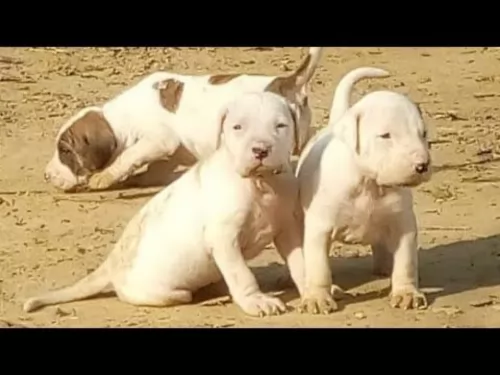 Basically most of the health problems depend on the dog to dog. If you choose puppy carefully, with an adequate examination of professional you will have a healthy dog. Alangu Mastiff is overall healthy breed, but as every other breed, they can develop some issues. Hip dysplasia is can be common for this breed, but again, only if you don’t select your puppy carefully.
Basically most of the health problems depend on the dog to dog. If you choose puppy carefully, with an adequate examination of professional you will have a healthy dog. Alangu Mastiff is overall healthy breed, but as every other breed, they can develop some issues. Hip dysplasia is can be common for this breed, but again, only if you don’t select your puppy carefully.
 Rhodesian Ridgebacks are generally healthy, robust dogs, but like with all breeds, they can also have their share of some of the common dog illnesses there are.
Rhodesian Ridgebacks are generally healthy, robust dogs, but like with all breeds, they can also have their share of some of the common dog illnesses there are.
If you’re buying a puppy, make sure it comes from a good breeder.
This is a hereditary disease which can become worse because of environmental factors such as rapid growth. The thighbone doesn’t fit properly into the hip joint.
It is sad when you see such a strong dog succumbing to hip dysplasia as it can cause a lot of pain and also make your dog lame. Arthritis can also occur.
For such a life threatening illness with a dog, it is wise to familiarize yourself with an emergency vet in your area. A dog with bloat needs to be rushed to the vet as soon as possible.
That is why it is better to feed your pet smaller meals daily rather than one big meal. Bloat is an ailment where there is rapid accumulation of gas in the stomach.
Dogs with deep chests are at a greater risk of bloat. Typical symptoms of bloat include restlessness, a swollen, hard stomach and trying to vomit.
Canine bloat or gastric dilatation and volvulus is a killer with dogs, with the gas accumulation causing the stomach to twist.
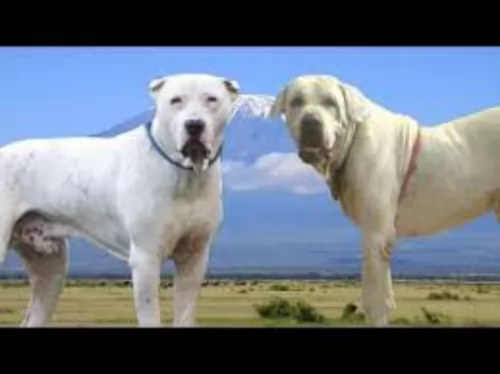 Feeding of your dog highly depends on activity, size, and food that you are feeding your dog. 5-10 cups of high-quality food divided into 2 meals would be enough for an average Alangu Mastiff, but again, you should feed your dog based on activity.
Feeding of your dog highly depends on activity, size, and food that you are feeding your dog. 5-10 cups of high-quality food divided into 2 meals would be enough for an average Alangu Mastiff, but again, you should feed your dog based on activity.
Puppies must eat 3-5 times per day, few cups of high-quality food. They need to eat quality food with a lot of vitamins and minerals to develop into a happy and healthy adult.
Groming is one of the easiest jobs that you should do around your Alangu Mastiff. They are very easy to take care off. Few brushes every now and then would be enough to have perfectly groomed pet. They do not have long coats with a lot of fur so there will be no hair around the house, and maintaining this majestic creature is very easy.
 The Rhodesian Ridgeback only sheds a little so you can keep him looking good with a brush twice a week.The shiny coat can be maintained by wiping him down with a damp cloth. Look out for any unusual lumps you might find.
The Rhodesian Ridgeback only sheds a little so you can keep him looking good with a brush twice a week.The shiny coat can be maintained by wiping him down with a damp cloth. Look out for any unusual lumps you might find.
He has floppy ears so during your grooming session check inside his ears and make sure they aren’t red. You can suspect an ear infection when you see your Ridgeback shaking his head or scratching his ears.
Check inside your Ridgeback’s mouth too as dogs can’t tell you when they’ve got a rotten tooth that is causing terrible pain and also poisoning their entire system.
Trim his nails too if they don’t wear down naturally.
Your large Rhodesian Ridgeback will need good food from you if you want to have less visits to the vet because of illness.
If you have a puppy feed him 4 bowls of food a day, but once your dog is one year of age he can have two bowls of food. Two bowls are better than one as with one bowl, your dog becomes ravenous and gobble his food down. This can lead to bloat.
It is always convenient to feed him one of the top quality commercially manufactured dog foods but he will also need some tasty home-made food too. Boiled chicken, brown rice or pasta and spinach, sweet potatoes and carrots are a healthy choice for your pet – plain and simple dog food, just like dogs want.
They don’t want exotic, spicy foods that humans eat as it upsets their stomach. Chop this home-made food up ad put it into his dry kibble twice a week for a treat. Also try to give him a bit of raw meat occasionally. Never leave him without a constant source of fresh, cool water.